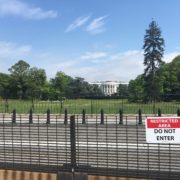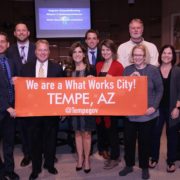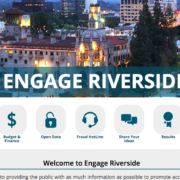
The City of Durham is taking "crowdlaw" in a different direction, asking people to improve its existing open data policy.
Continue readingTrump, Threats to Data, and US Cities

Sunlight's John Wonderlich reflects on the Trump administration's relationship with data, the difficulty in reporting on broad trends in data transparency, and the role US cities increasingly play.
Continue readingOpen data by default: Challenging but worth it

When people are asked to shift the ways that they think about and use data, resistance is normal. Here's how Tempe, Arizona is building a culture that treats data as a strategic asset.
Continue readingHow American cities can help close the national trust deficit

cities are at the center of ongoing, important national discussion about how data can serve the American people, wherever their mayors sit on the political spectrum.
Continue readingRiverside connects communities to sustainable open data

Whether through apps, passing open data policies, or new channels for collaboration on systemic issues like homelessness, Riverside is taking meaningful steps to connect its people to their own data.
Continue readingOpenGov Voices: Local governments get “On Board” with opengov
On Board is a tool by Michigan Suburbs Alliance that provides local officials with a secure database where they can access and manage information about boards and commissions. Simultaneously, it helps residents find information about these bodies and get involved.
Continue readingWhat makes Pittsburgh’s open data law different
On March 11, Pittsburgh joined the growing number of cities who have adopted open data policies across the United States. So, how does Pittsburgh’s open data policy stack up to the other policies already out there?
Continue readingYour Guidelines to Open Data Guidelines Pt. 2: Stages of Development
In revisiting Sunlight’s Open Data Policy Guidelines for our Version 2.0 release, we took a closer look at other sources for open data guidance that have been released over the years. To see a comprehensive round up of open data guidance (complete with a timeline!) see Part 1 of Your Guideline to Open Data Guidelines: The History.
Although it’s only been eight years since the first resource of this kind was created with the Open Knowledge Foundation's Open Knowledge Definition, exploring open data guidance in its totality not only shows how much these recommendations build on each other, but how the movement has matured. Moreover, many of these resources occupy separate-–but overlapping-–arenas of expertise, though an outside perspective may not immediately catch their nuances. Below, we’ll explore in more detail the three major themes of open data guidance: How to Define Open Data, How to Implement Open Data, and How to Open an Open Data Discussion.
The sequence, prevalence, and layering of these themes showcase the developmental stages of the open data movement thus far. Over the years we have seen open data advocacy emerge from its nascent expert-driven defining period to becoming (quite self-referentially) a public discussion. We’ve seen different missions of the major players in the open data movement inform nuanced definitions and implementation recommendations, and we have seen an increase in best practice assessments, academic critique, and diverging schools of thought.
To understand this larger story, let us look at each piece.
Continue readingWhen will Open Data come to your town?
Whether you’re steeped in the open government world (as we at Sunlight are) or are not yet familiar with capital-O capital-D Open Data Policies, there are two key elements you’ll see taking a bird’s eye view at open data policies in this U.S.: They’re new and they’re gaining momentum.
Continue readingOpenGov Voices: Local Government Financial Transparency: Scaling It Up
Disclaimer: The opinions expressed by the guest blogger and those providing comments are theirs alone and do not reflect the opinions of the  Sunlight Foundation or any employee thereof. Sunlight Foundation is not responsible for the accuracy of any of the information within the guest blog.
Sunlight Foundation or any employee thereof. Sunlight Foundation is not responsible for the accuracy of any of the information within the guest blog.
Marc Joffe is the founder of Public Sector Credit Solutions (PSCS) which applies open data and analytics to rating government bonds. Before starting PSCS, Marc was a Senior Director at Moody’s Analytics. You can contact him at marc@publicsectorcredit.org.
Groups like OpenOakland and Open City have done some great work in making local government financial data more accessible. Machine readable data sets and visualizations help citizens better understand how their tax money is being used.
Because these efforts typically require volunteers and/or visionary political leaders, they tend to focus on individual governmental units. Since the U.S. has some 80,000 local governments, it is unlikely that these standalone projects will give us anything like nationwide transparency of local government fiscal data. Building a nationwide open data set would be very beneficial because it would allow users to compare their city or county to comparable units across the country. It could answer such questions as “how does our public safety spending stack up against other cities with similar population and crime rate?” It could also allow us to compare the fiscal condition of cities in order to see which are headed in the direction of Detroit, Harrisburg, San Bernardino and Stockton – toward bankruptcy.
 A Mountain View California based company, OpenGov.com, is working with several local governments to place their fiscal data online, in graphical form. If successful, this firm could greatly increase the amount of open government financial data – for those governments that are willing to subscribe to their transparency service.
A Mountain View California based company, OpenGov.com, is working with several local governments to place their fiscal data online, in graphical form. If successful, this firm could greatly increase the amount of open government financial data – for those governments that are willing to subscribe to their transparency service.
But what about situations in which a local government is unwilling to cooperate and volunteers are unavailable? This universe is likely to include some of the more fiscally irresponsible governments in places that lack tech-savvy, engaged citizens.
In these cases, we can collect and report data on behalf of those governments. Recently, my group, Public Sector Credit Solutions, collected legally mandated financial reports from 260 city governments in California. We extracted standardized data from these reports and placed the information online for free here. We’d love to work with other groups to roll out this type of fiscal transparency to other types of local governments (like counties and regional transportation districts) and to the rest of the country.
Continue reading

